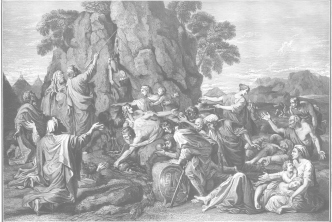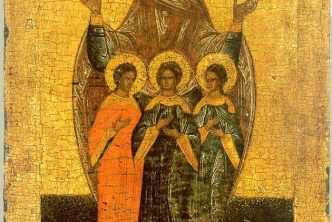Deepen your understanding of the Scriptures with Come and See: Catholic Bible Study Collection!
Let’s take an excerpt today’s Gospel reading for the Feast of the Annunciation:
In the sixth month the angel Gabriel was sent from God to a city of Galilee named Nazareth, to a virgin betrothed to a man whose name was Joseph, of the house of David; and the virgin’s name was Mary.
And he came to her and said, “Hail, full of grace, the Lord is with you!”
But she was greatly troubled at the saying, and considered in her mind what sort of greeting this might be. And the angel said to her,
“Do not be afraid, Mary, for you have found favor with God. And behold, you will conceive in your womb and bear a son, and you shall call his name Jesus. He will be great, and will be called the Son of the Most High; and the Lord God will give to him the throne of his father David, and he will reign over the house of Jacob for ever; and of his kingdom there will be no end.” (Lk 1:26–33).
Come and See: Catholic Bible Study Collection enriches your spiritual experience in multiple ways, with in-depth reflection on Scripture, including commentary on verses and translations of different Bibles, and quotes from papal writings and the saints. All of these resources are brought together and presented in an easily-accessible format. Here’s the commentary for the reading above:
Although Gabriel is God’s servant first, He is also Mary’s servant. He addresses Mary with the unique description kecharitomene, “a “woman perfected in grace.” No one else in all the pages of Scripture receives this kind of a greeting! Saint Jerome translated this as “gratia plena,” and the best English translation is the traditional “full of grace” (Douay-Rheims and RSCVE). Such renditions as “so highly favored” (Jerusalem Bible) or “highly favored daughter” (New American Bible) fail to convey the full depth of meaning.
Nowhere else in the pages of Scripture does an angel (who always speaks infallibly for God) address a human being this way. Angels themselves are full of grace, and Gabriel speaks to Mary as to one like himself. Now, before Christ’s death on the cross there was no way for a human to become emptied of sin. Therefore, the only way Mary could be full of grace is if, like the angel, she always had been. Gabriel reveals that the Virgin Mary was free from sin and full of grace…
Gabriel’s demeanor and the tenor of his words defer to Mary not as someone beneath him, as in the meeting with Zachariah, or even on the same level. He appears before his own queen, the future Queen of Heaven who will reign forever as Queen of the angels and saints…
The new era of salvation begins with the conception of Jesus in the womb of Mary. Saint Bede compares the first mother of mankind, Eve, with the new mother, Mary. Where Eve once contained in her womb all humanity, which was doomed to sin, now Mary contains in her womb the new Adam, Jesus Christ, who will father a new humanity by his grace (The Synoptics 11,12).
Enjoy special savings on Come and See: Catholic Bible Study Collection through the end of the month.






